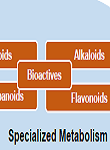|
|
|
Is a plant’s ploidy status reflected in its metabolome?
|
|
|
|
|
|
|
|
|
|

|
|
|
Bibhu P. Parida, and Biswapriya B. Misra
|
|
|
|
Fakir Mohan University, India, and University of Florida, USA.
|
|
Fakir Mohan University, Balasore, Orissa, 756019, India AND Genetics Institute, UFL, FL 32610, USA
|
|
biswapriyamisra@ufl.edu
|
|
|
|
|
|
|
|
|
|

|
|
With the enrichment of metabolomic information in a diverse number of plants, the obtained datasets reflect on important aspects of plant growth, function, physiology, productivity, and adaptation to changing biotic and abiotic environments. Many of these plant species are natural polyploids that are either model plants, crops, or are of commercial interest. Decades of efforts have resulted in artificially induced polyploids from in vitro micropropagation practices as well. Recent efforts using next generation, high throughput genome sequencing approaches have contributed to our growing understanding of their genome ploidy status and the inherent biosynthetic potentials of encoded metabolomes. However, the ever perplexing questions galore regarding the metabolic status of these polyploids across plant genomes remained. Thus,...
|
|
|
|
|
|
|
|

|
|